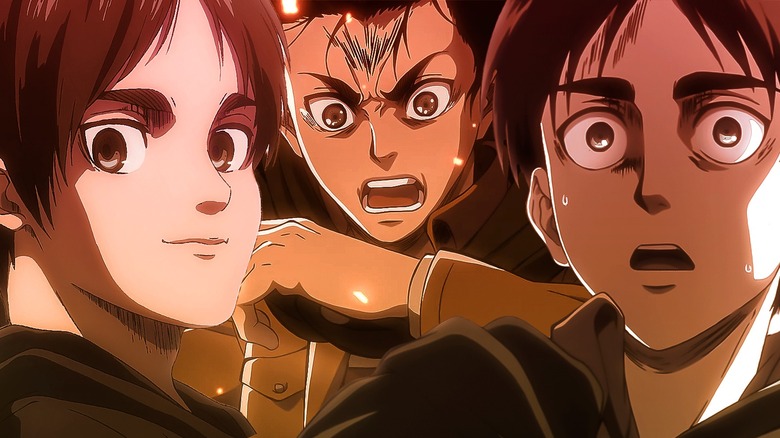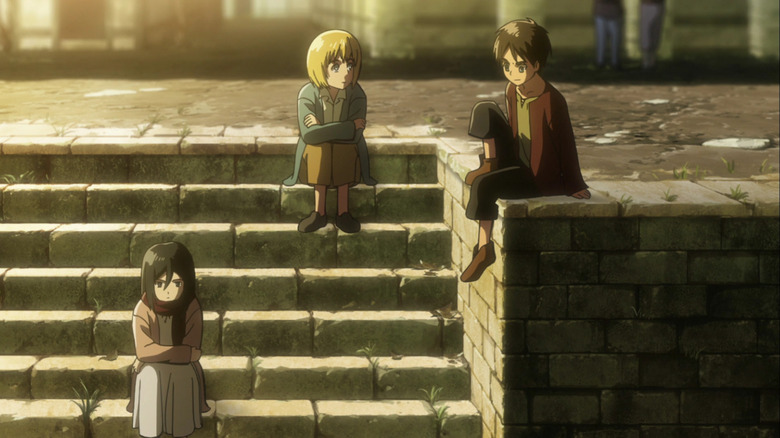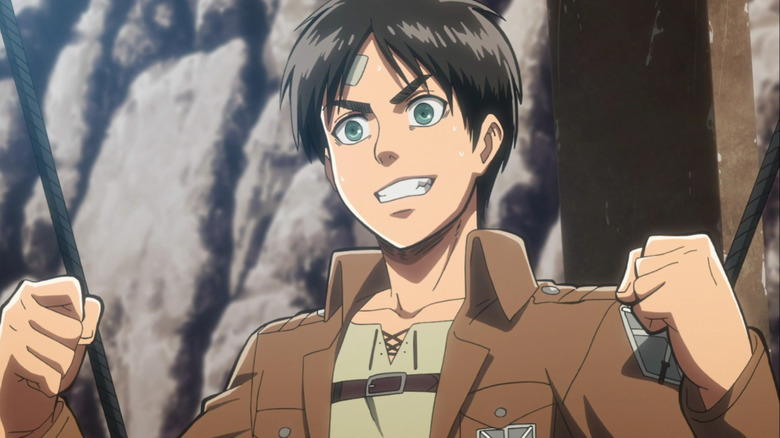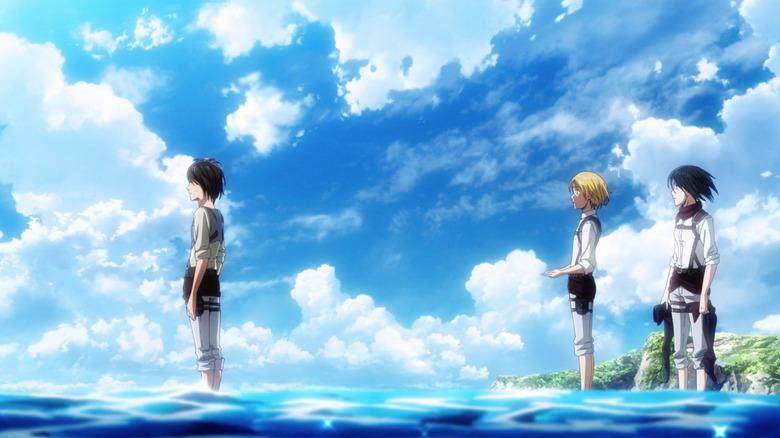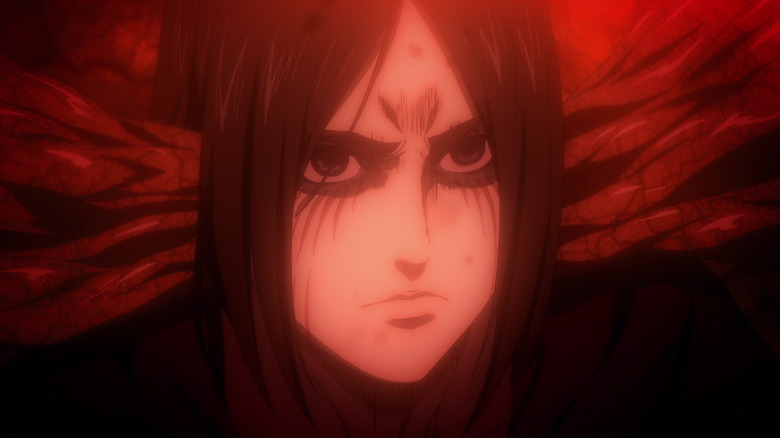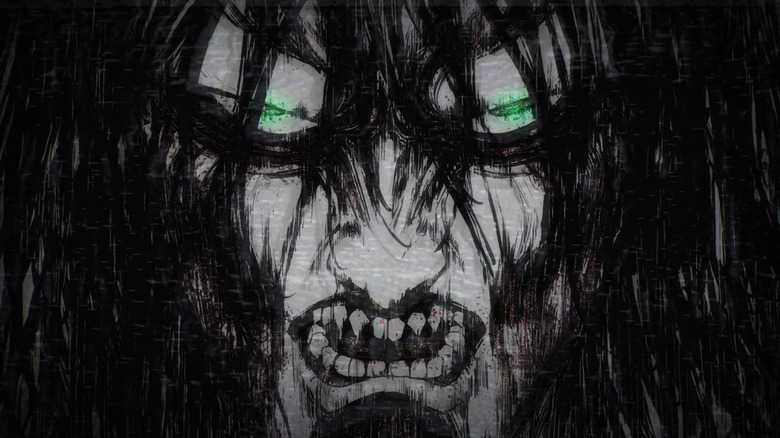Attack On Titan Forced Us To Fall In Love With A Villain, And Other Anime Should Take Notes
Since the brutal death of Eren's mother in the very first episode, "Attack on Titan" has been known for its shocking plot twists. However, nothing could prepare fans for where the show would take Eren Jaeger (Yuki Kaji/Bryce Papenbrook) in Season 4 of the series. Having snuck into the enemy territory of Marley and disguised himself as a veteran by mutilating his own body, Eren revealed his true plans to Reiner (Yoshimasa Hosoya/Robert McCollum) with a coldness we'd never seen in him before.
Naturally, the time jump that occurs between Season 3 and Season 4 of "Attack on Titan" does a lot of the heavy lifting with this development, as it offers plenty of opportunities for flashbacks that can help to show the nuance of Eren's changes over time. Still, even taking that into consideration, fans of the series would no doubt agree that a heel turn like Eren's has never been better accomplished in any other anime than it was here.
There's a reason "Attack on Titan" soared to the top of global viewership charts in Season 4, and it's because fans couldn't tear themselves away from watching Eren's dark transformation from hero, to anti-hero ... and finally, to full-on villain. So how did the series pull off this trick? Well, as always with "Attack on Titan," it was by planting the seeds early on. And looking back, the show's brilliant subversion of tropes is something that other shonen narratives should take a long, hard look at.
Eren was once idealistic about seeing and changing the world
At the start of "Attack on Titan" we witness Eren's loss of innocence as the titans break through the walls of Shiganshina. Crushed beneath her fallen house, Eren's mother implores Hannes (Keiji Fujiwara/David Wald) to carry her children away from danger. Then Eren watches on Hannes shoulder as his mother is gruesomely devoured by a titan.
This is the beginning of Eren's character growth — and is actually pretty typical of shonen protagonists as far as backstories go. Like Tanjiro (Natsuki Hanae/Zach Aguilar) in "Demon Slayer" or Edward (Romi Park/Vic Mignogna) and Alphonse (Rie Kugimiya/Aaron Dismuke) in "Fullmetal Alchemist," it's not uncommon for shonen heroes to lose it all at the start of the story and for that to inform their motivation and character development over time.
However, despite his early idealism and childlike drive to see the wonders of the world hidden outside of the walls, Eren always had a layer of darkness to him that other anime protagonists generally lack. While Deku (Daiki Yamashita/Justin Briner) from "My Hero Academia" wants to become a hero and Goku (Masako Nozawa/Sean Schemmel) from "Dragon Ball Z" wants to protect his friends and the Earth, Eren's goal was to "kill every last titan," a phrase which he spits with ravenous venom, even as a child.
There was always a darkness to Eren that other shonen protagonists lack
Three early betrayals helped to cement this darkness in Eren early on. First, there was the revelation that Annie (Yu Shimamura/Lauren Landa) is a titan shifter in Season 1 and has been attacking the Scout Corps throughout the story. Still, with Annie locked away in a crystallized shell at the end of Season 1, Eren is robbed of any answers for why she did what she did.
Then comes Reiner and Bertholdt's (Tomohisa Hashizume/David Matranga) jaw-dropping Season 2 reveals that they are the Armored and Colossal Titan, the same two titans who broke the walls in the series premiere of "Attack on Titan." Being that these are characters that we've grown to like and respect over the course of the series, we feel Eren's shock and rage at his former friends and identify with him because of it.
By dialing us into Eren's motivations like this consistently throughout "Attack on Titan," the show has slowly tricked us into relating to him throughout, even as his actions grew increasingly murky in Season 4. All the same, before that, when Eren wistfully pointed across the ocean and asked "If we kill our enemies over there, will we finally be free?" not even his closest friends, Mikasa (Yui Ishikawa/Trina Nishimura) and Armin (Marina Inoue/Josh Grelle), understood what he was really asking.
One moment defined when Eren truly began his journey to being the villain
The reason why so many fans have gone along with Eren's descent into darkness for so long is that the end of Season 3 revealed the long held truth of the Eldians. Similar to other persecuted groups from the history of our own world, Eldians are treated as second class citizens and forced into ghettos and work camps and must even wear armbands denoting their status.
Meanwhile, across the sea in Paradis, the Eldians are attacked mercilessly by Marley, even as they cower in fear behind the safety of the walls. Eren compares living this way to being penned in like livestock, waiting for their turn to be killed and eaten, and it's an apt analogy that helps to paint the picture for viewers.
Thus, when Eren launches his vengeful counterattack in Marley after so many years of pain and suffering, we're initially on his side. However, this development in "Attack on Titan" takes a brutal turn, as Eren's plan not only puts his friends lives in danger but also causes the deaths of untold civilians, including women and children. As the carnage of Eren's revenge is unleashed, we get our first look at who Eren has become in The Final Season. Since then, Eren has been less a man and more of an unstoppable force as he has steered the will of humanity toward the most destructive event in the history of the world: The Rumbling.
Eren's motivations in Season 4 were always murky at best
Smartly, "Attack on Titan" tries to give Eren excuses and a way out of these developments by suggesting over the course of The Final Season that he's being manipulated or controlled, or is perhaps working from within to expose a traitor. All of these explanations are dismissed by Eren himself though when he sits down for a frank conversation with Mikasa, Armin, and Gabi (Ayane Sakura/Lindsay Seidel) in Season 4.
This is the moment where Eren becomes a full-on villain, as he dresses down his former friends and even beats Armin senseless, just to make a point. From here, his descent is only deeper and darker as he heads toward his final meeting with his half-brother, Zeke (Takehito Koyasu/Ernesto Jason Liebrecht), in Shiganshina and activates The Rumbling, destroying all three walls and unleashing countless Colossal Titans to flatten the rest of humanity outside of the island.
Still, it isn't until this key moment that Eren's allies suddenly realize that he's lost for good, and that he's damned the rest of the world to chaos, death, and destruction. This also is the icebreaker that forces Eren's former friends and his enemies to unite together in a last desperate attempt to stop him. Even now, some fans are still clinging to Eren as the hero, but really, when every surviving character in "Attack on Titan" unites against the hero-turned-villain, that's pretty much the final indicator that his transformation is complete and there's no coming back for him.
After becoming godlike, there's no turning back for Eren
Now, as fans of have seen in the latest supersized episode of "Attack on Titan," Eren has become godlike and has no means of turning back, even if he wanted to. Like Dr. Manhattan in "Watchmen," Eren now experiences all time simultaneously, as we see from him remembering a boy he once saved as he is being crushed under his current onslaught of Colossal Titans and is helpless to stop it.
With this revelation and Eren's confirmation to his friends that they will have to kill him to stop him, Eren's apocalyptic death march will be his final act on this earth, one way or the other. His lasting legacy will be one of worldwide destruction, with millions dead, and the genocide of entire peoples crushed beneath the feet of his massive, unstoppable army of giants.
It's a deft trick, and one that forces even Eren's most ardent defenders to see how truly awful he has allowed himself to become. As the survivors of The Rumbling and Eren's former friends face Eren down in a final confrontation this fall, what Eren's final moments will be will remain to be seen, but one thing is for sure: he's done far too much evil to ever come back from the brink now and if other anime want to chase the massive success of "Attack on Titan," they need to be willing to go just as dark and heavy as the anime megahit has in The Final Season.
